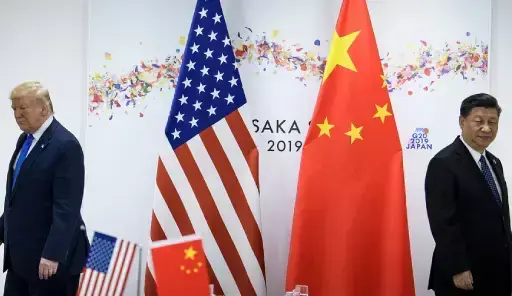China Gears Up for Potential Trade War Amid Trump’s Tariff Threats

China braces for a potential trade war as Donald Trump hints at steep tariffs, focusing on self-reliance, alliances, and economic resilience amid slowing growth and escalating tensions.
Beijing is preparing for a fresh spike of economic tensions as Donald Trump warns of a possible comeback of the US-China trade war. Focussing on building alliances, increasing technical self-reliance, and allocating money to protect its economy from outside shocks, the Chinese government is apparently getting ready with remedies against the prospect of high tariffs.
China is ready for a renewed economic conflict.
China's economic problems might become more severe as Trump underlines his will to impose harsh tariffs on Chinese products and accuses Beijing of unfair trade practices. The timing couldn't be worse given the Chinese economy is struggling with slowing growth and expected failure in its 5% yearly objective.
Trump's tariffs started a trade war that sour ties between the two biggest economies in the world during his previous tenure. China seems to be acting more deliberately this time. Analysts believe Beijing would take advantage of US-allied divides while looking for early concessions to lessen the effects of possible tariffs.
"China will retaliate to build negotiating leverage," Renmin University's foreign affairs specialist Wang Yiwei warned. "Trump's cost needs to be great enough to cause him to rethink his actions."
Trump's all-encompassing tariff proposal presents a looming threat.
Rising trade tensions during his first term, when tariffs ranged from 7.5% to 25%, Trump has promised to put a 60% levy on all Chinese imports. Trump's strong posture shadows over the next Asia-Pacific Economic Cooperation (APEC) conference in Lima, Peru, where Biden and Chinese President Xi Jinping are slated to meet. With Biden poised to take over office in January 2025.
Crisis in the property market
China's property industry helped the country's economy in 2018, but the market has subsequently fallen into a protracted crisis drastically lowering government income. Local governments are financially strapped by the overabundance of homes and the slow revival of the industry.
The Bank of International Settlements estimates that China's debt—including family, business, and government obligations—now totals 350 trillion yuan—triple the size of the country.
Limited Local Demand
At less than 40% of GDP, China's household expenditure below the world average by 20 percentage points. Still limited are structural changes meant to increase consumer expenditure, such changes in taxes and social benefits enhancement. Beijing has instead given modernising its export-driven manufacturing industries—including solar technology and electric cars top priority.
Although these developments have been beneficial, they have limited the growth potential by causing retaliatory tariffs from the US, Europe, and other countries.
Deflationary Pressures
Deflation has resulted from low spending, a property downturn, and extra production capacity. From a 4.6% rise in July 2018 to a 2.8% dip in September 2024, producer prices have declined. Additionally slowing down consumer price inflation has been a drag on economic growth.
Limit of Depreciation in Currency
A 10% yuan devaluation helped to offset US tariffs' effect in Trump's first term. But with Trump now proposing 60% tariffs, the yuan would have to drop by 18% to balance the impacta situation that might cause instability in China's financial system.
Unknown Possibilities
China profited from unanticipated export prospects both during the COVID-19 epidemic and during Russia's isolation following the Ukraine incursion. These favourable circumstances, however, are rare and Beijing will have to face future difficulties on its own terms.
The Road Ahead
China has a difficult balancing act as Trump's possible Oval Office comeback looms. Although reprisal seems unavoidable, Beijing is supposed to exercise caution and use diplomatic and financial tools to limit the consequences of a revived trade war.
Whether this strategy works will rely on both countries's capacity to negotiate their tense relationship without aggravating further world economic turbulence.








